Septic Tank Types
Septic tanks should be cleaned every 3 to 5 years depending on household size and usage. Regular pumping of the septic tank will reduce accumulation of scum and sludge layers in the septic tank.
The scum layer should never reach 24 inches thick, if the material reaches 24 inches and beyond in depth, material will flow into the outlet pipe and into the drainfield and plug up your drainfield, causing drainfield failure.
To have your septic tank cleaned, you will need to locate your main compartment & 2nd compartment lid of the septic tank. You will also need to uncover the baffle lids as well, that will allow us to check your inlet baffle for blockages and clean the screen in the outlet baffle (if one is installed and your tank lid configuration).
Septic tank lid location and number of lids vary by year installed and manufacturer. See the septic diagram below.
Express Septic Service can locate and dig the Septic Tank lids for you, if you prefer not to do so, or if you do not know where the lids are located. We can obtain an as-built drawing (if available) from County Health Department for you (NO CHARGE). An as-built will give the general location of the septic system components, but will not give the exact location of the septic tank lids.
Septic Diagrams:
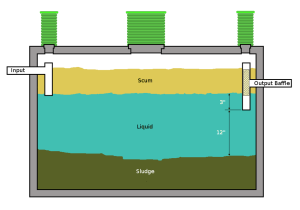 Single Compartment
Single Compartment
500 – 1,000 Gallon Septic Tanks: Installed up to approximately 1976, this tank style will have one main lid and two smaller baffle lids on both ends of the tank as shown in the diagram below.
[ Click the pictures for a larger image ]
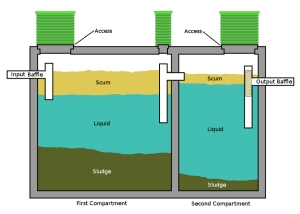 Two Compartment
Two Compartment
1125-1200 gallon septic tank configuration installed from late 1976 to present This tank can have 2 main 24″ lids or 2 main lids and 2 small baffle lids at both ends of tank directly above the inlet and outlet baffle, depending on manufacturer.
You will be looking for 2 lids like these if there are risers to surface on the tank. If the tank is not risered, you will find 2-24” diameter concrete lids like the picture below. Riser lids the can be below the surface which will require locating and digging the riser lids as well.
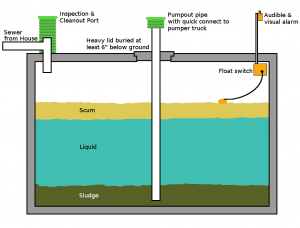 Holding Tank
Holding Tank
is an alternative to a conventional on-site sewage system. A holding tank is not a septic tank. A holding tank stores household waste and does not allow any of its contents to leak into a drainfield, whereas a septic tank will allow waste water to flow into a drain field.
Holding tanks can be made of concrete, fiberglass or polyethylene. Holding tanks can be installed above or below ground. Holding tanks need to be pumped frequently depending on the water and waste water usage and the size of the tank.
Most holding tanks are equipped with alarms that will sound when they are nearly full and will require pumping shortly thereafter. Failure to pump a holding tank will lead to waste water backing up into the house or onto the ground.
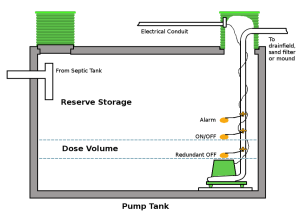 Pump Tank
Pump Tank
In addition to a septic tank some homes may have a pump tank or a pump basin. Pump tanks are underground near the septic tank, depending on the year the system was installed you may have risers to surface making for easy access to inspect and maintain the effluent pump for maintenance or if the pump has quit working. A pump tank or basin collects effluent from a septic tank, or ATU (Alternative Treatment Unit) before it pumps the effluent to the drainfield area. The pump tank contains a sewage effluent pump, control floats, and a high water alarm. The control floats are set so that a specific volume of effluent is sent to the drainfield. When the effluent in the pump tank rises to the level of the on float the pump is activated and pumps the level of the effluent down until it reaches the off float setting. There is also an alarm box located in the house (usually the basement or garage or side of house) that sounds when there is a problem or malfunction with any of the components in the pump tank. When the alarm sounds there is a reserve storage in the pump tank to provide the homeowner with light water use until the system can be addressed as to why the alarm has sounded.
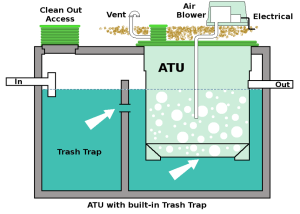 Aerobic Treatment Unit (ATU)
Aerobic Treatment Unit (ATU)
Some homes that may have poor soil drainage, small lot size, or environmental concerns, may use an alternative treatment system instead of a traditional septic tank and gravel trenched drainfield. Most alternative treatment systems consists of a multi compartmented tank called an Aerobic Treatment Unit called an ATU. Most ATU’s contain 3 compartments, a “trash” compartment, an aeration chamber, and a clarifying compartment.
The trash compartment holds the solids for pretreatment and liquification of waste, and retains non waste incidental products that get flushed down the toilet. The Aerobic Chamber treats the effluent by aerating the effluent in a tank with an air blower motor which also agitates the water so solids cannot settle, and the oxygenated effluent allow the digesting bacteria to thrive and significantly reduce the solids content. The clarifying chamber allows the remaining solids to settle, further clarifying the effluent. Some ATU’s will also do additional treatment with an ultraviolet light, or they may use chlorine tablets that are made specifically for your type of septic system, these components are designed to kill bacteria and pathogens before passing the effluent onto the drainfield. There are many different types of ATU’s; Nuwater, Fast, Whitewater, and Norweco are the most popular in Washington State and all have passed rigorous testing before being approved.
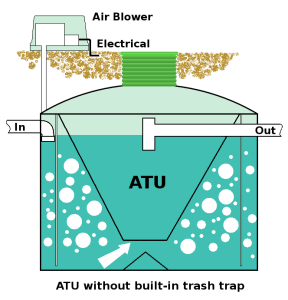
Each ATU system may have a different type of drainfield which can vary from gravity, pressure distribution, Glendon mound, sand filter, or drip irrigation. Due to the complexity of the system, all ATU‘s with pumps and treatment devices, must have regular maintenance and inspections performed every 6 months to every year depending on what type of system that has been installed and depending on what County Health Department and each Manufacture require. All routine operation and maintenance inspection or service will need to be performed by a Health Department Certified Operation and Maintenance Specialist and some manufactures require you to be certified by their company to perform these services. The operating and maintenance costs are higher due to; the number of different working components, the ultraviolet light bulb will need to be replaced, (typically every 2-3 years), and if you have chlorine tablets they will need to be added every 6 months, (on average), the electrical demands of some of the components and the service contracts required to hire qualified service person.
Again, it is imperative to have these types of systems monitored frequently and repaired as needed to ensure proper operation and to keep your system trouble free.
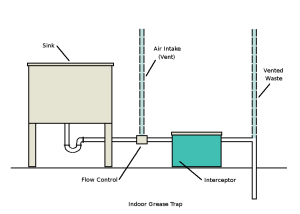 Restaurant Grease Trap
Restaurant Grease Trap
Every food service establishment that serves food and washes dishes- from restaurants, café, coffee shop, delicatessens or bakery will have an indoor grease trap found near the sinks to gather grease from the sink. They can range in size from 20-50 gallons. A Grease trap is a chambered compartment that prevents fats, oils, grease (FOG) from entering your drain pipe. Grease drains into the trap, allowing the grease to solidify and float to the top, while weighted solids fall to the bottom of the trap and leaving the liquid to flow out through the drain pipes to the septic tank or city sewer.
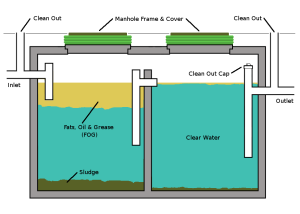 Grease Tank Interceptor Service
Grease Tank Interceptor Service
A Grease interceptor is a large tank found outside of the building. They can range in size from 100 gallons to thousands of gallons. If you have an outside tank, the first tank will be a grease trap (tank) where grease will be held until it is removed. The bathrooms will go into a tank that is designated only for the waste from the restrooms, if on sewer the waste will go to the city sewer. All grease traps need periodic pumping and maintenance in order to prevent your drain pipes from backing up. We have several options available, from a simple cleaning rooter service using a power snake or to hydro-jetting using high pressure water to break apart solidified grease to keep the drain flowing.
